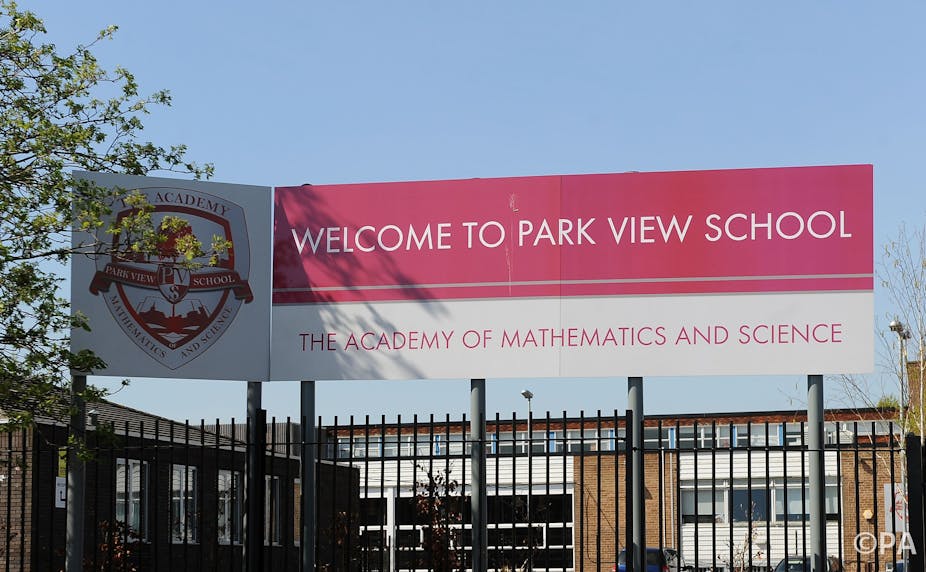The recent furore around the so-called Trojan Horse plot, which has seen 25 Birmingham schools being investigated over fears of a takeover by radical Muslims, raises wider issues for the already beleaguered schools inspectorate. Not only has the scandal raised questions over Ofsted’s capacity to inspect such a nebulous school system, but also its ability to remain politically impartial while doing so.
Snap inspections resulting from revelations of an alleged plot by hardline Islamists to infiltrate the school curriculum and governing bodies, segregate pupils, and discriminate against non-Muslims, have been carried out at the behest of the secretary of state Michael Gove at a substantial number of Birmingham’s schools. Although these inspections have gone ahead, there are still serious questions over whether the Trojan Horse plot document is in fact a hoax.
As a result of these inspections some schools may face being placed in special measures or “requires improvement” categories, although they had previously been judged to be good or outstanding.
Park View School is one of these. Based in the Alum Rock area of Birmingham it was one of the first schools to be inspected under Ofsted’s 2012 inspection framework and was judged outstanding. Its recent figures from 2013 point to a successful school with good results.
Ofsted does not intend to announce its findings of the new inspections until the end of May. But should these formerly successful schools indeed be placed in special measures, and their governing bodies, and curriculum deemed unsatisfactory – elements which should by rights have both been picked up in the schools earlier inspections – where will this leave the schools’ inspectorate?
Ofsted head Michael Wilshaw’s personal involvement in sorting out the crisis reveals just how high the stakes are, and not just for the schools involved.
The issue has been seized upon by the media and many who had questioned the rationale and ideology behind Gove’s academy and free school project.
Many saw it as hard evidence of the failings of what they see as a rash and reckless programme of change, pursued with little evidence to indicate that these changes would indeed lead to a more equable and fair system of education and raise achievement across the board.
And the government drive to impose academy status on schools following unfavourable Ofsted inspections, has created an uncomfortable proximity between Ofsted and the government agenda. This has lead to a rash of allegations that the inspectorate has lost its ability to inspect “without fear or favour” and has relinquished its independence from government.
Dogged by controversy
Ofsted is no stranger to controversy. Since its inception in 1992 it has been buffeted by political tides, parliamentary enquiries into whether it provides value for money, and criticisms as to the professionalism and capabilities of its inspectors.
Within five years these criticisms reached a crescendo following publication of international reports on student attainment and achievement, such as the PISA rankings, which placed England behind its European counterparts.
The inspectorate attempted to respond to its many critics with the introduction of a radical new inspection framework in 2012. It also re-modelled its workforce to include school leaders from good and outstanding schools within its inspection teams.
Despite this, the pace of change in the English education system since then has accelerated with not only even greater numbers of academies and free schools, but new federated school structures with increasingly complex and convoluted forms of governance.
These involve multi-level systems with structures that in many instances mirror complex corporate institutions, and act as an effective layer of accountability: often the only layer, between the secretary of state for edcuation and schools themselves.
The criticism of school governors culminating in a recent parliamentary enquiry, placed even greater pressure on an already overloaded inspectorate, burdened with the seemingly impossible task of ensuring parity of provision and consistency of approach across this convoluted and hyper-complex system.
A history now a mystery?
Ofsted’s original mandate was fairly simple. In line with John Major’s Citizens Charter, it was tasked with opening up the secret garden of education in order to ensure that parents were armed with more information about schools.
Its mantra was, “We inspect without fear or favour”, presumably fearing neither government censure, nor seeking the favour of the teaching profession. It has since shown a remarkable ability to transcend the electoral cycle, chiefly due to its ability to evolve and change in order to avoid going the way of the many other quangos set up during the same period – ending up as a headstone in the quango graveyard.
In contrast, Ofsted has attained and retained centrality within the education system and shown a marked capacity to exert a Prospero effect on education policy: a powerful yet not always discernable behind-the-scenes influence.
But in its drive to remain at the very apex of education in England and in the attempt to retain control of a system that in its very shapelessness, defies this particular type of control, the Trojan Horse plot, has revealed the true challenges faced by the breadth and scope of Ofsted’s current remit.
To judge schools to be failing that it previously judged to be good or outstanding because of a direct mandate from the government, may be the ultimate challenge to its claims to operate both political impartiality and ability to function effectively.
If this is indeed the case, it would seem that after 20 years Ofsted’s credibility and usefulness as a tool to govern education may well have run its course.

